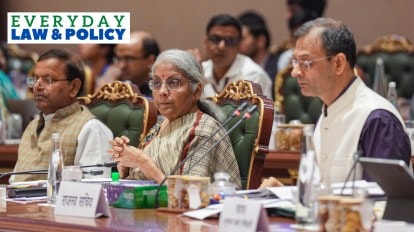The 53rd Goods and Services Tax (GST) Council met in Delhi under the Chairpersonship of Nirmala Sitharaman, Union Minister for Finance and Corporate Affairs, on Saturday (June 22). The council recommended taxes on items such as milk cans and solar cookers and announced some relief for students living in certain kinds of rented accommodation. It also reduced the GST on cartons from 18% to 12% to provide relief to apple farmers in Himachal Pradesh and Jammu and Kashmir.
The Chief Ministers of Goa and Meghalaya, Deputy Chief Ministers of Bihar, Haryana, Madhya Pradesh, and Odisha, and the Finance Ministers of States & UTs (with legislature) were also at the meeting. Here’s how the body functions and why it matters.
What is the GST Council?
The GST regime came into force after the Constitutional (122nd Amendment) Bill was passed by both Houses of Parliament in 2016. More than 15 Indian states then ratified it in their state Assemblies, after which then-President Pranab Mukherjee gave his assent.
It came into effect in 2017 and was billed as an attempt to simplify the existing tax structure in India, where both the Centre and states levied multiple taxes, and to make it uniform.
The President set up the GST Council as a joint forum of the Centre and the states, under Article 279A (1) of the amended Constitution. It said that members of the Council include the Union Finance Minister (chairperson), and the Union Minister of State (Finance) from the Centre. Each state can nominate a minister in charge, of finance or taxation or any other minister, as a member.

Why was the GST Council set up?
According to Article 279, the council is meant to “make recommendations to the Union and the states on important issues related to GST, like the goods and services that may be subjected or exempted from GST, model GST Laws”. It also decides on various rate slabs of GST, whether they need to be modified for certain product categories, and so on.
In 2023, Haseeb A Drabu, the former Finance Minister of Jammu and Kashmir, wrote: “As India’s first genuinely federal and fully empowered institution, the GST Council is more than administrative break from the past. It is a bold experiment in pooling Union and State sovereignty that has changed the concept and contours of federalism in India.” (‘The Goods and Services Tax Council: Dialectics and Design’ State Capacity Initiative Working Paper No. 2023-10. Centre for Policy Research)
 While the subsuming of some of the states’ taxation powers may be seen undemocratically from one perspective, he wrote, “Within the GST Council, intergovernmental cooperation is not only negotiated but, on many occasions, made contingent.” For example, the states possess a significant share of voting power in making collective decisions. He added: “The GST Council has also demonstrated an alternative way of formulating laws. On many occasions, the Council has converted itself into a drafting committee. The Council has discussed draft laws section by section—even line by line—making changes in real time while taking inputs from all members.”
While the subsuming of some of the states’ taxation powers may be seen undemocratically from one perspective, he wrote, “Within the GST Council, intergovernmental cooperation is not only negotiated but, on many occasions, made contingent.” For example, the states possess a significant share of voting power in making collective decisions. He added: “The GST Council has also demonstrated an alternative way of formulating laws. On many occasions, the Council has converted itself into a drafting committee. The Council has discussed draft laws section by section—even line by line—making changes in real time while taking inputs from all members.”
What has changed over the years?
In 2022, the Supreme Court stated that the recommendations of the GST Council were not binding, in a judgment (Union of India and Anr versus M/s Mohit Minerals Through Director). The court said Article 246A of the Constitution gives both Parliament and state legislatures “simultaneous” power to legislate on GST and recommendations of the Council “are the product of a collaborative dialogue involving the Union and States”.
The court pointed out that Article 246A of the Constitution stipulates that both Parliament and state legislatures have “simultaneous” power to legislate on GST — and recommendations of the Council “are the product of a collaborative dialogue involving the Union and States”. (Article 246A (“Special provision with respect to goods and services tax”) says: “(1) Notwithstanding anything contained in articles 246 and 254, Parliament, and, subject to clause (2), the Legislature of every State, have power to make laws with respect to goods and services tax imposed by the Union or by such State.”)
Further, the court said the GST Council has an “unequal voting structure where the states collectively have a two-third voting share and the Union has a one-third voting share”. Some states, such as Kerala and Tamil Nadu, hailed the judgment, believing that states could now be more flexible in accepting the recommendations as suited to them.
This is an updated version of an explainer first published in 2022.


